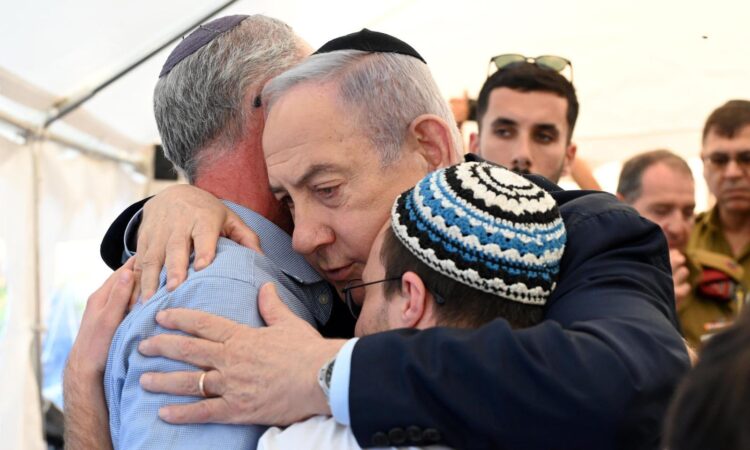
NEW DELHI: Reports of a possible ceasefire in Gaza to enable the release of some Hamas-held hostages and Palestinian prisoners in Israel are yet to be confirmed, but Tel Aviv has practical reasons for wanting one. Ever since the war, the shekel has plummeted to an eight-year-low, the central bank has slashed the projected growth rate from 3% to 2.3% while the unemployment rate has risen by 70,000 according to Israel’s Employment Service in October – up 57,500 from a month earlier. In fact, analysts say the situation is so bad that a number of leading economists in Israel have called for the Netanyahu government to “come to its senses.”
For Amsterdam-based geopolitical analyst Cyril Widdershoven, Israel’s economic crisis comes as little surprise. “The Israeli government knows that within a week or even the next few weeks, it will be forced to negotiate. This is because 360,000 military reservists (8% of Israel’s workforce) are fighting in Gaza. Add the fact that ultra-Orthodox Jews do not work in Israel and you have the making of a crisis.”
The reservists are away from their jobs resulting in a drop in productivity. Data from Israel’s Bureau of Statistics says that one in three businesses have either shut down or are operating at 20% capacity. Those bordering Gaza have fared the worst with 2/3rds either shut or operating at the minimum. More than 700,000 citizens are jobless following the evacuation, reserve duty call-ups, and so on.
Every day the war lasts costs Israel $260 million while the impact on the economy to date amounts to nearly $8 billion.
Politically, the government is under pressure from the hostages’ families who are demanding to know why the government has not done more to secure their release. News of Hamas offering a hostages-for-prisoners swap has deepened the growing rifts among Israelis. “While it is true that all Israelis – ultra-right-wing, liberal and left – are rallying behind the flag for now the deep divides will force the government to call for negotiations on a ceasefire. This is why the government is looking to hit Hamas as hard as it can in the limited time that they have.”
The big question is who will govern Gaza. While Netanyahu has stated that an Israeli force must control Gaza post the Hamas operation, the US says no. US Secretary of State Antony Blinken’s surprise call on Palestinian Authority President Mahmoud Abbas in Ramallah suggests that Washington favours Abbas to be in control post the operation. However, Abbas is deeply unpopular not just in Gaza but the West Bank. A recent survey held by the Ramallah-based Palestinian Center for Policy and Survey Research found that 80% of Palestinians want him to go. The situation is so bad that Abbas cancelled promised elections in 2021 knowing that he would lose.
So where does Israel go from here? Widdershoven believes that the Arab nations need to step in. “Eradicating or completely annihilating Hamas is not possible. What Israel should look to do is completely remove the infrastructure that Hamas has and then look to bring in Arab nations. This makes the most sense as Egypt, UAE, Bahrain, and Saudi Arabia do not like Hamas, PLA, Fatah, Islamic Jihad, or any of the groups in Gaza. The Arab nations will not like it and pressure will have to be put on them to do so.”
Widershoven believes the war is also affecting Israel’s warm ties with Russia’s President Putin, who has not only backed away from his former friend Netanyahu by inviting Hamas leaders to Moscow; he was also being seen as unable or unwilling to crack down harder on anti-Jewish rioters in Dagestan.
“Putin is playing a clever game in that he is using the crisis in Israel to maximise divisions within the European Union,” said Widdershoven. “One must remember that nine of the 27 EU member states recognize Palestinian statehood, and a large number of the EU member states that recognize Palestinian statehood were once members of the Soviet-aligned Eastern bloc. He is also calculating that Israel will not fully close the door on Russia because of the many Jews in the country. However, Israel will extend support to Ukraine because the military technology that Ukraine needs could be provided by the Israelis. This is where Putin could be making a mistake.”
Asked whether Russia or China could play any meaningful role in the ongoing conflict, Widdershoven responded with a firm no. “The only military power in the world is the US. It has never been seen that the US has three aircraft carriers in the same region – two in the East Mediterranean and one in the Persian Gulf. However, China’s reluctance to talk to the various sides could hit OBOR because the Arab nations may well feel that it has done next to nothing during the crisis. This could work to India’s advantage as I foresee IMEC could get a big advantage out of this post the operation.”






